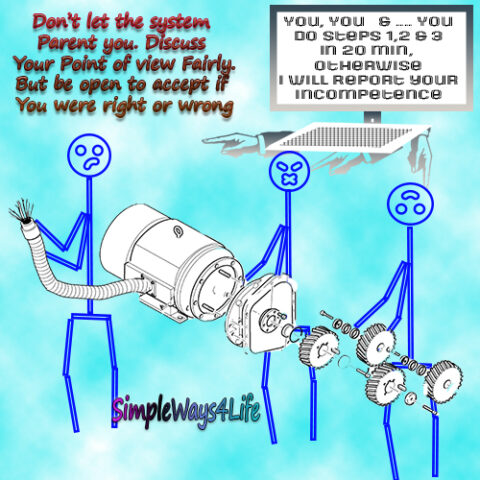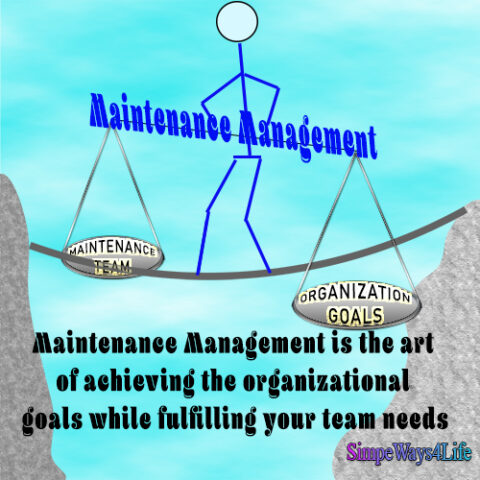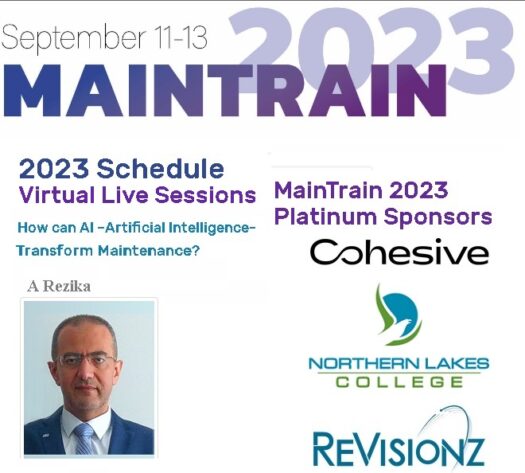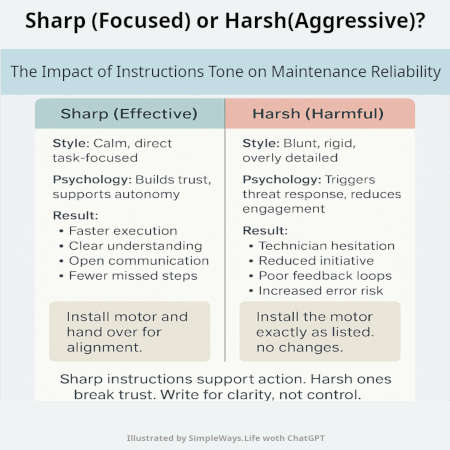It should be clear that there is no worship for any Maintenance System. No matter is it a computerized, manual, automated, a part of an Asset Management or Enterprise Resource Planning, it is your assistance. Never let it be your boss. It is a little bit sophisticated from the psychological point of view. Instead of parenting ourselves to follow the routine maintenance work we are supposed to do, we look for a system that report our bad behavior. Instead of looking for the gaps in our maintenance system and to target closing them, we look for a system that has the answers and the solutions to all out pains. So, don’t allow maintenance system to parent you.
And, the cycle repeats. With time you lose enthusiasm to any new system and its reports. You start feeling it is not adding a value to you. Moreover, if you feel it will denote your mistakes, expose your secret knowledge, control your work, you will fight it.
Existing System temple
You know, sometimes, it is easier to follow a set of rules (system) blindly without thinking. The problematic part arises when we make a system then we are tied up to it even if we can’t get results out of it. Even if we didn’t literally made up the system but at least some equally minded colleagues had come up with it. It was satisfactory to them at one point in time. However after few years and a new generation is using the system. Now the system turned to be their new boss that they are trying to satisfy to avoid the red marks or flags in the monthly or annual reports.
For any system even a a manual one there are the advocates who tend to abide everyone to the system in the way they understand the system. Those are stubborn when it comes to a needed system modification. Sometimes, you have a system in hand that doesn’t feel like fulfilling all what you want. You might fall in the trap of demanding a new system that solves all your problems. After long waiting for a system that will show everyone the right things to do and will pin point any laziness, this system won’t come as you expect out of the box, even if you are knitting it yourself.
What is needed to draft a maintenance system or a request for a system?
This problem is clearer when you don’t have as system in place or you think so. Instead of drafting your own one, you wait for the magic system that will set everything right. That’s usually ends up as a day dream.
Any maintenance system starting from the high-ticket systems to the basic ones drafted at home with the help of your IT colleagues, needs some basic data to construct the system:
- What equipment do you have?
- Which equipment do you want to attach to the work order?
- How you code, number or name those equipment that they are well known by everyone?
- What activities do you want to attach to each equipment?
- Do they have calendar cycle or working hours cycle?
- How to trigger an activity?
- What Failures do you want to record?
- Are they general or specific to each equipment?
- You can find a guide in this chat: Maintenance 101 : Documentation – 1
You don’t need to answer every question while you are drafting a a locally designed system on spread sheets or access. But to convert it to a full fledged system, you need all these in addition to some data about the resources as parts, tools and spares and their cost.
The source of those functions can be:
- Existing or as-is activities
- Equipment manuals
- Experienced workers
- Supplier recommendation
- Failure analysis and conclusions

Is it easier to be forced?
Some of the managers eager to have the best maintenance system from a reputable supplier because it comes with industry know-how and expert libraries of activities. This means that the system will touch the ground with the wheels running. The true story is that those frameworks need to be customized to your existing equipment and work flow. Moreover, if you may think of just mapping your equipment code to the pre-built system libraries; then rolling it out for execution. This will be frustrating to the shop floor who will feel disengaged when the system pops up a workorder that no one knows how to execute it.
Sometimes we take too much time to change what we are used to do or what we are instructed to do. Other times we prefer not to change anything and to continue with what is in hand to avoid confrontations. In both cases we are waiting for an external force to enforce the change. You can read more of how we project to our timeline in this chat: Events in Our Environment, are they haphazard? Key 6-3,
Why we don’t want to change?
- We have targets and we proudly fulfill and exceed them. We perform the needed tasks. I am worried about doing them differently?
- When there are no measures and we are used to repeat same dull work and claim boredom. This may seem as a strange target but actually it keeps you in your comfort zone.
- If we have a valid excuse for every problem as that the available system is not supporting us to do better. Then we feel that you are forever protected.
- When we are afraid to try something new that we may fail to get accommodated to.
- If we don’t want to recommend modifications as it may turn useless or the condition gets worse than before. This might be unsupportive working environment
Looking for, waiting for or claiming the absence of a system that will let us do the job that we overlook or show us how to do the work correctly is a big lie. It might seem as an excuse when the number of assets is big enough i.e. 100’s of equipment is there. So, manually going through them to find which asset is due for oil change this week and which one needs an air filter will be a tedious job. However, you need to prepare these data to feed the new system. Anyhow, it is a job to be done. To continue it like the old days. it needs more manpower and working hours. When the number of assets is in the order of 10’s, it can be managed through spread sheets. The recorded data can also be analyzed there.
It is all about leadership
You can be a team leader even if this title is not an official one in your workplace hierarchy. Leaders need leadership skills. Leaders guide, help, clarify, point to options and, recommend solutions. One basic leadership skills that will help the Maintenance system survive is to be yourself believing in the system. You need to believe in the benefits that the system will bring to your work.
Whether the maintenance system is manual or automated in any way it will help you to remember what jobs you need to do, how you will do it, allow you to retrieve historical data, allow you to record feedback and, show you some trends. Above all, the system must have the ability to be updated and customized. Your believe and master of those basic concepts will help you start a new system, keep an existing one alive or to update it to serve you better.
In Conclusion,
Maintenance System is not your boss or your enemy. It is your ally to do better easier jobs professionally. It is simple to start a system if you don’t have one. Just you need to look for as much as possible data needed to structure the system as we described in this article and adding them to the system. I wish you a great morning coffee.
If you feel you need help with any of these ideas we discussed, request a Management Consultancy or Coaching Services From our Store








3 Comments